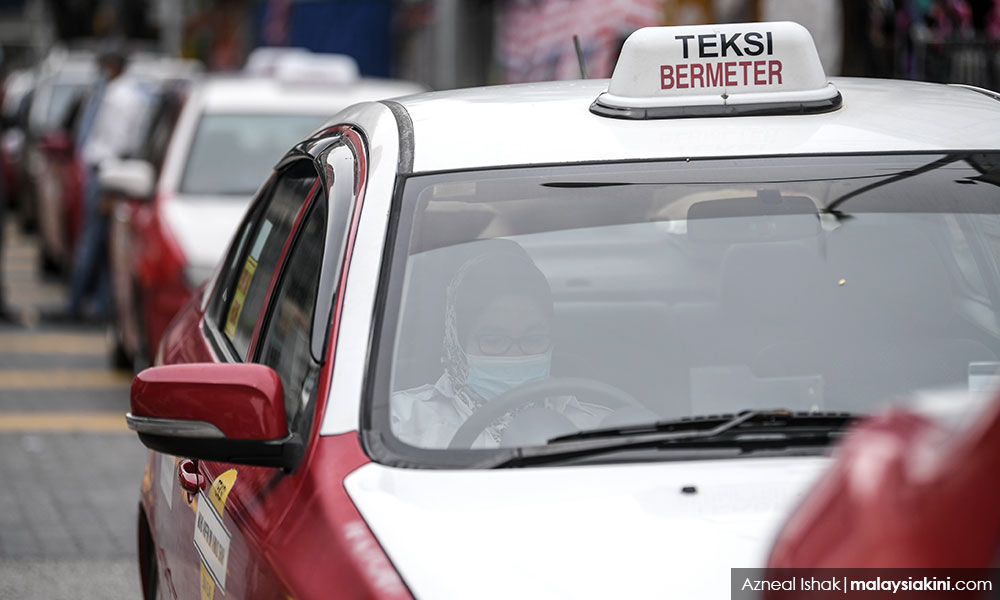Grabcar will know on July 14 whether they succeed in their legal bid to strike out a RM100 million class-action lawsuit by Malaysian taxi drivers against the e-hailing company.
The Kuala Lumpur High Court fixed the decision date after having heard submissions from both parties in the legal action during online proceedings conducted today.
The cabbies’ counsel, R Kengadharan, confirmed that judge Ahmad Bache set the decision date for Grabcar’s striking out application.
“The judge reserved judgment and will deliver his decision on July 14 at 2.30pm via Zoom,” the lawyer said when contacted by Malaysiakini.
Counsel Kwong Chiew Ee acted for Grabcar for today’s hearing.
On Dec 4 last year, the Malaysian Association of Taxi, Rental Car, Limousine and Airport Taxi filed the writ of summons over Grabcar’s alleged running of an illegal e-hailing service nationwide between 2014 and 2017.
The legal action listed the plaintiffs as 15 taxi drivers representing the association while Grabcar Sdn Bhd was named as the sole defendant in the suit.
According to a copy of the statement of claim, the plaintiffs claimed that Grabcar’s e-hailing service, from May 16, 2014, to July 27, 2017, contravened the Transport Act 2012, the Competition Act 2010 and the Federal Constitution.
The cabbies alleged that Grabcar violated the provisions of the Transport Act, among others, by “giving a false statement that the defendant (Grabcar) is qualified to carry out an online public transport service despite not being given leave and permission at that time by the Road Transport Department (and) the government of Malaysia”.
They also claimed that the e-hailing service was not given any exemption under the Competition Act to carry out the service during that period, among other contentions.
The cabbies claimed that Grabcar had been operating without a licence from May 16, 2014, to July 27, 2017, due to an alleged violation of the Contracts Act 1950.
They alleged, as a result, every profit the e-hailing service received for that period ought to be returned to the cabbies as a "remedy of restitution to the plaintiffs".
Through the lawsuit, the cabbies seek, among others, RM100 million in liquidated damages as well as general, aggravated, exemplary and punitive damages.

In its statement of defence filed by Grabcar, it contended that its e-hailing business was not in direct competition with Malaysian taxis.
Grabcar claimed that its business involved facilitating arrangements, bookings or transactions for the provision of land transport services by drivers for passengers through an online mobile platform.
It said that the then unregulated space for e-hailing services meant there was no necessity under the law for the firm to obtain a special license nor was there a government agency to apply for one from.
Grabcar claimed that only when the amendments to the Land Public Transport (Amendment) Act 2017 and the Commercial Vehicle Licensing Board (Amendment) Act 2017 came into force on July 12, 2016, were it and other e-hailing operators given a one-year moratorium by the Transport Ministry to obtain an intermediation license.
"Following the introduction of the LPTAA 2017 and CVLBAA 2017, the defendant (Grabcar), in compliance with the new laws, then applied for and was granted an intermediation license on March 28, 2019.
"As such, it is denied that the defendant had carried on its operations unlawfully from May 16, 2014, to July 27, 2017, as alleged or at all," the firm claimed in its statement of defence.
Grabcar also, among others, alleged that the Malaysian Competition Commission (MyCC) had never made a finding that the firm had infringed upon the provisions of the Competition Act 2010.
It also contended that the cabbies failed to show in what way they had suffered damages or loss over any alleged action of the firm.
Onn Feb 8, the e-hailer filed the application to strike out the main legal action, contending among others that the association has no locus standi (legal standing) to represent cabbies in the country.
Through the striking-out bid, Grabcar among others also claimed that the suit was time-barred as it was filed more than six years after April 16, 2014 (the writ of summons was filed on Dec 4 last year). - Mkini




No comments:
Post a Comment
Note: Only a member of this blog may post a comment.